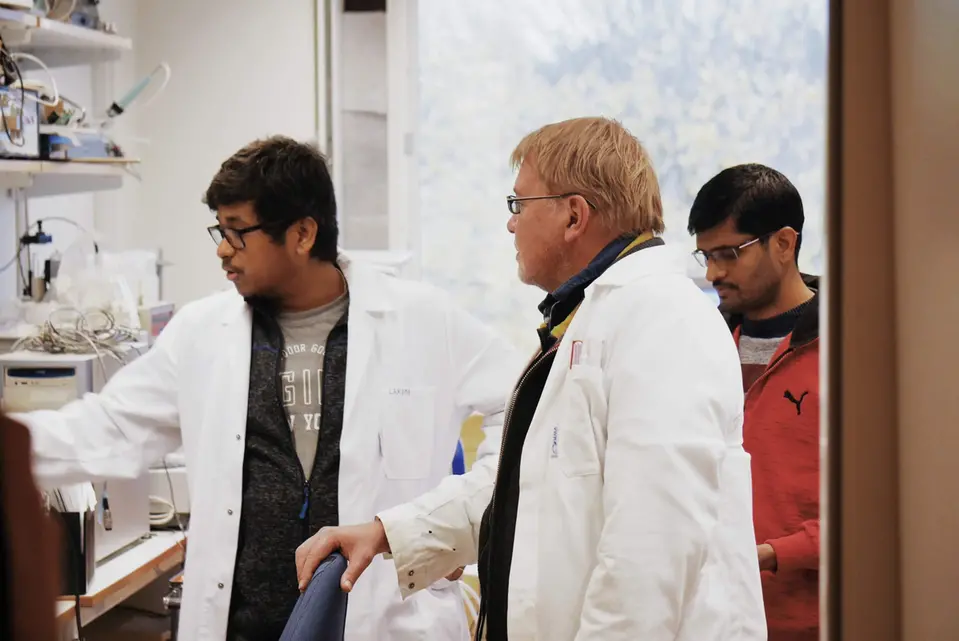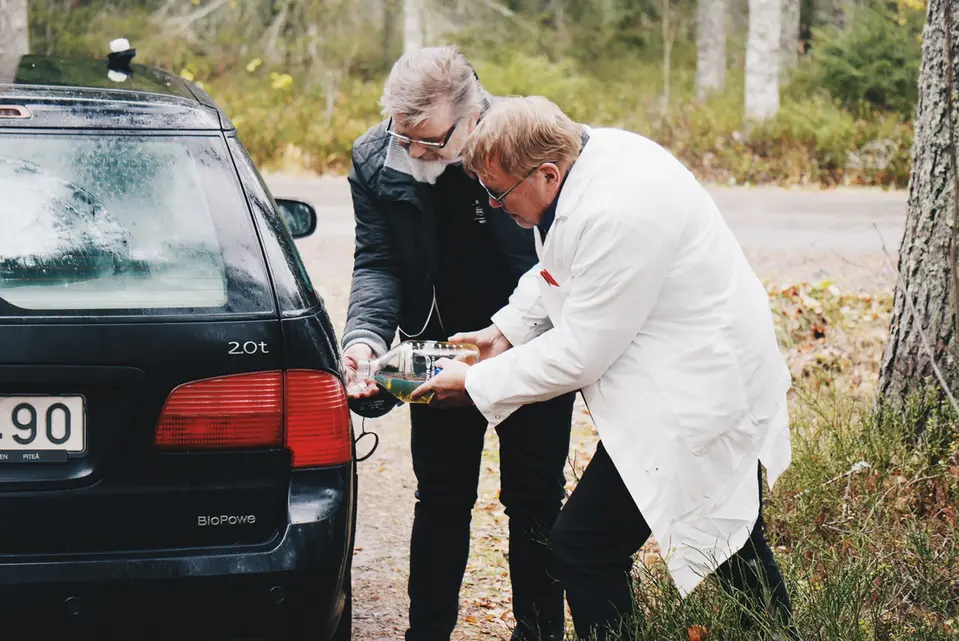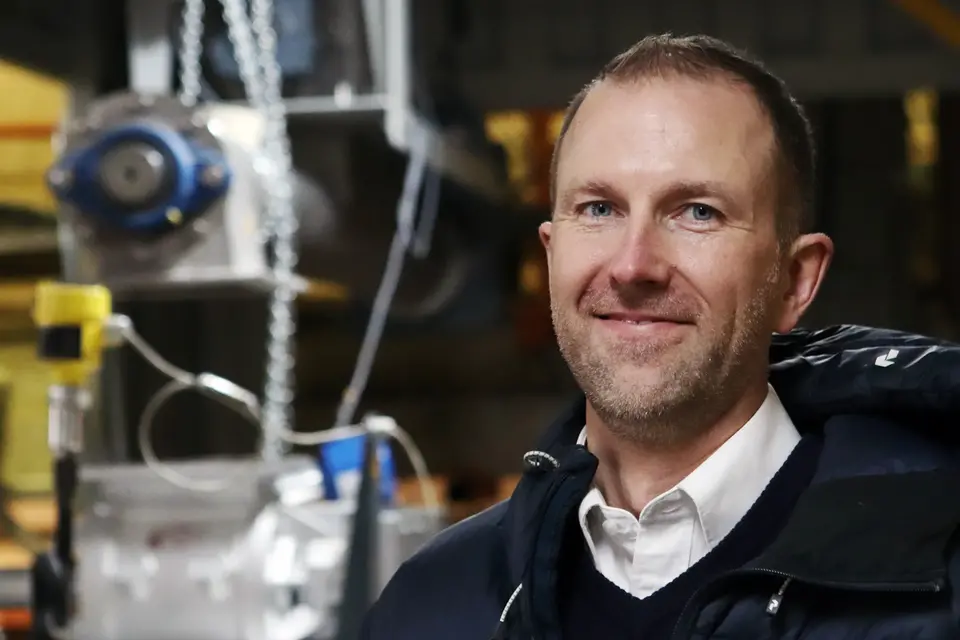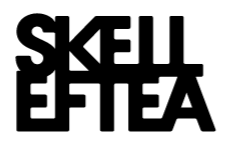ENERGY AND CLEANTECH
Envigas and eco-oil - clean tech at the forefront
Northern Sweden in general and Skellefteå in particular have put themselves on the map when it comes to Cleantech initiatives. Clean energy at a reasonable price, proximity to universities and collaboration between companies in the region are often seen as some of the reasons for this success. Envigas and Eco-Oil are two examples of companies that have contributed to this development with solutions that are as unique as they are revolutionary.
Envigas and Eco-Oil have one thing in common. Both companies take biomass, including agricultural waste, cutter shavings, sawdust and bark, and convert it into different types of fossil-free fuels - ones that can replace the fossil fuels that have a negative impact on the climate.
But we're taking them one at a time. Envigas was founded by Harry Johansson and Håkan Holmberg. The company uses a proven technology for pyrolysis of forest residues, which in simple terms means using a direct-acting screw that is heated to high temperatures in an oxygen-deficient environment. The process converts the organic material into biochar, bio-oil and pyrolysis gas, three fully renewable products.
- When the biomass is heated up to 600 degrees, many harmful gases, known as volatiles, are also driven off. If we take biochar as an example, it becomes very clean, which in itself makes it suitable as a substitute for fossil coal in the steel industry, for example," says Tobias Brink, CEO of Envigas.

Investing in heavy industry
The pyrolysis gas created in the process can be used to fire boilers. It can also be converted into methanol or hydrogen if you want to add value to it. The bio-oil can replace conventional fossil oil as a fuel or be converted into bio-crude oil, serving as a feedstock for refineries producing jet fuel, diesel or petrol. It can also be used as a pigment in rubber, plastics and printer toner.
Tobias Brink sees enormous potential in Envigas' biochar, which he sees as an important factor for the metallurgical industry in particular. The big mining companies in the north and a number of other large industries have long been putting their boilers in deep folds to find the solution that will make their operations less damaging to the climate. Tobias Brink is confident that Envigas can contribute to the solution.
- We can pyrolyse virtually any organic material. From bark and wood to vegetable residues, agricultural waste and sludge. And we know that our products work perfectly when it comes to replacing fossil fuels. We have a big market here in Sweden alone," says Tobias Brink.
Envigas does not sell plants, but builds, owns and operates process plants that convert biomass. In early 2019, the company's demonstration plant in Bureå outside Skellefteå was inaugurated.
- We want to remain in northern Sweden. This is where the raw material and many of our future customers are located. Imagine if Skellefteå could become a centre for fossil-free biochar in the future, the potential is clearly there, says Tobias Brink.
Petrol too expensive for a young boy
The Skellefteå-based company Eco-Oil is also developing processing plants. However, their focus is on the production of sustainable synthetic fuel based on energy crops. The company started in 2007, but the idea of a synthetic petrol was actually born back in 1987, in the youth of founder and CEO Kent Van Klint.
- I read in Science magazine about a guy in California who found it hard to get diesel. He was a chemist and went to McDonald's and asked to have their used fryer oil. He filtered it five times and then added a catalyst that pulled out the hydrocarbon atoms so that the oil became a working diesel. When I read this, I was a young kid who liked cars but thought the soup was expensive. I thought it should be possible to make a similar petrol," says Kent Van Klint.
The idea stuck with Kent, and when environmental thinking began to spread in society, he picked it up. To make a long story short, he took three ideas to Umeå University where he met with researcher Professor Jyri-Pekka Mikkola, who is now head of research at Eco-Oil.
- He ruled out two ideas straight away, but the third he believed in. He researched it for six months and then called me. In 2011, we tried the first green petrol in my lawnmower and it worked. In 2012, we had a chemically real petrol. But it wasn't until last year that the patent came through. 'You have to be patient and have an iron stomach in this business,' says Kent Van Klint.

The aviation fuel of the future is here
But it's not just fully renewable petrol that Eco-Oil's processing facilities produce. They can also produce green diesel and aviation fuel. The secret lies in the catalysts used and the green fuel can be made from energy crops, forestry waste, food scraps, household waste and even old newsprint.
- So the fuel is green because it is renewable, even the process is green where the feedstock, with the help of the catalysts, is converted into renewable diesel or gasoline as well as by-products in the form of a small amount of clean gas and pure deionised water, explains Kent Van Klint.
Tips for new entrants
For both Eco-Oil and Envigas, 2018 and early 2019 have been eventful times. Envigas, as mentioned, has inaugurated its demonstration plant in Bureå and Eco-Oil has long-standing plans for a demo plant in the Skellefteå area.
Eco-Oil has a patent on gasoline and a pending patent on diesel. The petrol is approved according to the European standard and Eco-Oil's diesel will be tested for approval according to EN590, which tests at the university show should go without a hitch. The petrol has proved attractive to the major oil companies as a low blend of Eco-Oil's all-fossil-free petrol solves the EU's reduction obligation for next year. The company is now working hard to get everything ready for production by 2021.
Both companies feel that Skellefteå Municipality has shown a positive attitude and willingness to support and develop during the long and sometimes winding road that must be taken when developing something completely new.
- At Eco-Oil, we have financed our operations privately but have also taken help from the university. You have to be patient in this business, get up after the first setback and fight on. My best advice is to contact your local university. There is a lot of good help there with analyses and studies," says Kent Van Klint.
Both Tobias Brink and Kent Van Klint also praise the accelerator programmes and incubators that have provided help along the way.
- Through ABI, for example, we have gained many new contacts and networks. They can also help with legal matters and contacts with local buyers and authorities. Whatever industry you want to establish yourself in, they are an incredibly good support," says Tobias Brink.
So what is it that has made Skellefteå such a hotbed for the new green industry? Is it something in the water or is it simply the long tradition of entrepreneurship coming into its own?
- There may not be a given answer to this question, but in Eco-Oil's case, it's probably because both Jyri-Pekka Mikkola and I are curious and incurable optimists from birth. That goes a long way," says Kent Van Klint.

Sidinformation
- Senast uppdaterad:
- 2 March 2023

